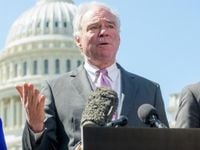In a significant political shift, the U.S. Senate has delivered a rare rebuke to President Donald Trump by passing a resolution aimed at nullifying his emergency declaration regarding tariffs on Canadian imports. The resolution, which passed with a narrow 51-48 vote, saw support from four Republican senators alongside all Democrats, marking a notable departure from party loyalty amidst Trump's aggressive trade policies.
The resolution specifically targets the national emergency Trump declared on February 1, 2025, to justify imposing tariffs on Canada, which the president claims is necessary to combat the flow of illegal fentanyl entering the United States. However, the facts surrounding fentanyl seizures tell a different story: U.S. Customs and Border Protection reported that only 43 pounds of fentanyl were seized at the northern border during the 2024 fiscal year, a stark contrast to the more than 21,000 pounds seized at the southern border.
Senator Tim Kaine, a Virginia Democrat and the resolution's sponsor, criticized Trump's rationale, stating, "This is not about fentanyl. It’s about tariffs. It’s about a national sales tax on American families." Kaine's sentiments were echoed by Senator Susan Collins of Maine, who expressed concerns that the proposed tariffs would adversely affect industries in her state, particularly those dependent on Canadian imports.
Collins articulated her opposition to the tariffs during a Senate floor speech, noting, "The price hikes that will happen for Maine families, every time they go to the grocery store, they fill their gas tank, they fill their heating oil tank, if these tariffs go into effect, will be so harmful." She further emphasized the reality that the majority of fentanyl in the U.S. originates from the southern border, not Canada.
Trump's tariffs have been a contentious issue, with the president labeling the four Republican senators—Mitch McConnell, Lisa Murkowski, Rand Paul, and Collins—as "disloyal" for their support of the resolution. In a social media post, Trump urged them to "get on the Republican bandwagon, for a change, and fight the Democrats' wild and flagrant push to not penalize Canada for the sale, into our Country, of large amounts of fentanyl." This public pressure, however, did not sway the senators, who prioritized their constituents' economic interests over party allegiance.
The Senate's action comes on the heels of Trump's announcement of sweeping tariffs on a range of international trading partners, a day he dubbed "Liberation Day." While the resolution's passage is largely symbolic due to the Republican-controlled House's likelihood of ignoring it, it still represents a significant break in the party's compliance with Trump's trade agenda.
Senate Minority Leader Chuck Schumer remarked on the implications of the vote, stating, "The American people are seeing how bad Trump is." He pointed to recent election results that suggest a growing discontent with Trump's policies, particularly regarding trade and economic impacts.
Despite the resolution's passage, many Senate Republicans remain apprehensive about the economic ramifications of Trump's tariffs. Senate Majority Leader John Thune argued against the resolution, asserting that it would weaken Trump's ability to combat fentanyl trafficking. He stated, "Will the cartels simply shift tactics and expand their operations to the north? I think we can be confident the answer to that question is yes." This perspective reflects a broader concern among GOP senators about the implications of undermining the president's authority on trade issues.
As the resolution moves to the House, where Speaker Mike Johnson has already indicated it will likely be shelved, the future of Trump's tariffs remains uncertain. However, the Senate's bipartisan vote highlights a growing divide within the Republican Party regarding Trump's approach to trade, particularly as it pertains to Canada, a key ally and trading partner.
In conclusion, the Senate's decision to pass the resolution against Trump's tariffs on Canada signifies a pivotal moment in U.S. politics, revealing cracks in the Republican Party's unity and raising questions about the sustainability of Trump's trade policies as the 2024 elections approach.









